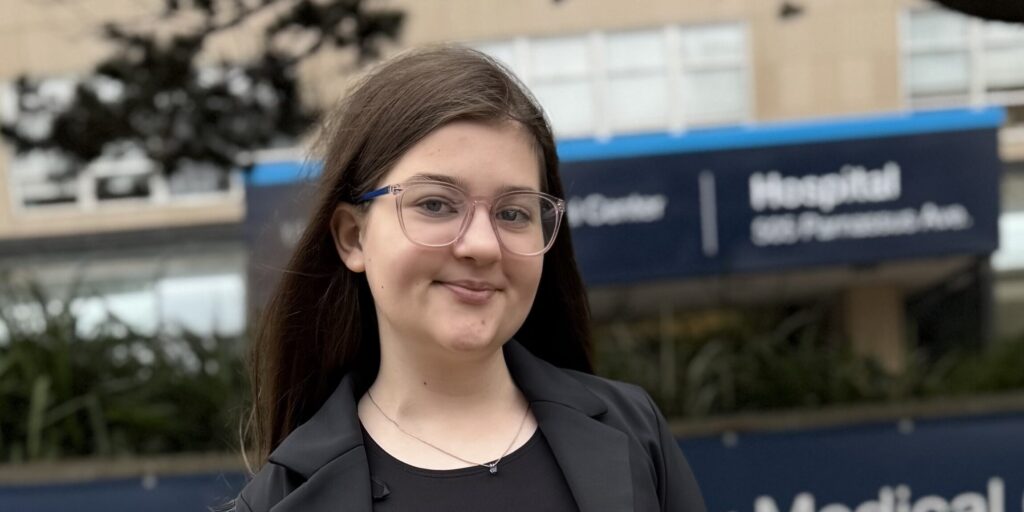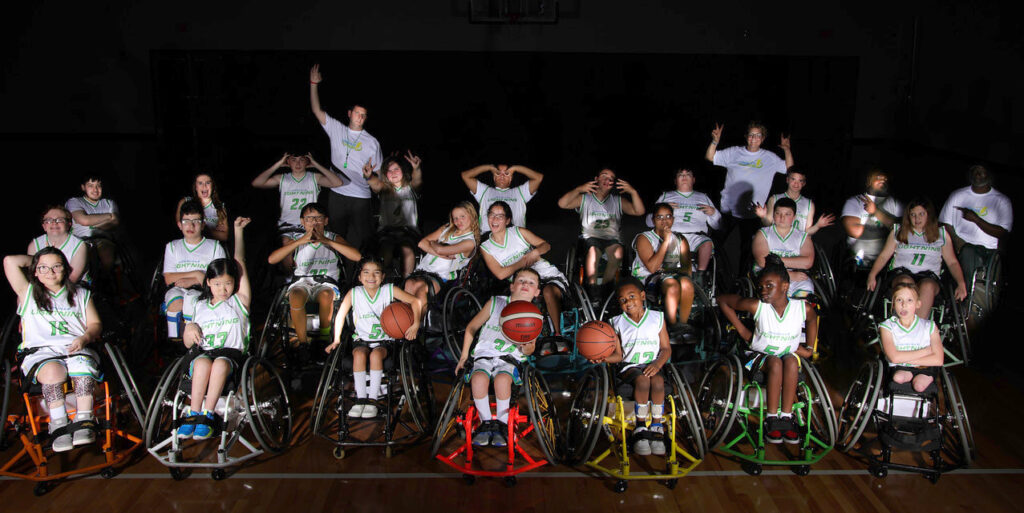
MDA Ambassador Guest Blog: How Adaptive Sports Changed My Life
By Brayden T. | Thursday, October 9, 2025
5 Second Summary
MDA Ambassadors play an essential role in furthering MDA’s mission while representing and empowering the neuromuscular disease community. Quest Ambassador Guest Blog series provides a platform to share their personal stories, perspectives, and experience.
Brayden is 17 years old and has been playing wheelchair basketball since he was 8. He is also a wheelchair track and field athlete. Brayden lives with Charcot-Marie-Tooth (CMT) Type 1A. He first became an MDA Ambassador when he was 5 years old and he loves supporting MDA’s mission. Brayden is consistently on the honor roll, has a 4.0 GPA, and has ambitions to pursue a career as an athlete.
Both of my brothers played sports, and my parents made sure that I wasn’t any different. Through their prompting, I was introduced to the love of my life one Saturday morning when I was 8 years old: wheelchair basketball.
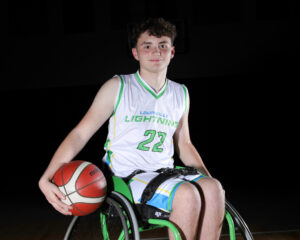
Brayden ‘s 2025 basketball picture
It wasn’t love at first sight, and honestly, I wasn’t very good, but I kept on going. I’ve been playing for 8 years, and I finally can say, I’m pretty skilled. The majority of disabilities that I had seen represented in adaptive sports were mostly people with amputations and spinal cord injuries. I had not seen many people with a disability like mine, and neither had my coaches. I had to learn A LOT. I had to figure out my own playing style, how to catch with limited feeling, how to shoot with limited arm strength, and how to deal with the fatigue.
During my freshman year of high school, I joined the track team and found I had a natural talent (for the first time ever). My first year on the team I won my first state championship in track and field, and I have won five more since then. I also started competing nationally, and my current medal count includes: one gold, two silver, and two bronze. These achievements are pretty cool, but what they did was even cooler. Sports have helped me accept my disability and have changed my identity from disabled to an athlete. For the longest time, I identified as an athlete but was labeled as disabled. Now, people know I’m an athlete. An elite one. People call me “state champ,” not “hot wheels”, and it makes me feel amazing that people know my identity.
In my sophomore year, my school district decided to start a wheelchair basketball team. I had already been playing for seven years, and the other players had never played. So, in the middle of my basketball season, I went from player to player/coach. I loved it. I discovered my true passion: being a mentor and sharing my knowledge. It didn’t just make them better; it made me better. I became a better ball handler, a better passer, a better leader, and a better team player. As a bonus, I have a group of kids who LOVE me and are my biggest supporters.
Throughout my experience I’ve learned a lot, and I’ve found some of the keys to success. Be an advocate, know your own limits, and don’t be afraid to try.
Be an advocate
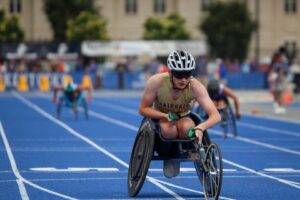
Brayden setting the current State record for the adaptive 100m dash, winning his 6th state championship
Advocacy is a skill that anyone with a disability truly has to master. In adaptive sports, it is still vital. Many sports may not have opportunities in your area, and you may have to push for them. It may be something as simple as asking to practice with an able-bodied team. No matter what, you can’t be afraid to ask and explain. Many people are uneducated about disability but truly care about others and want to help you along the journey – they just need to be guided. The sad fact is that if you don’t say anything, nothing will happen.
And while playing adaptive sports, it is important to be an advocate for yourself and your needs on the field. Others may not understand your disability, your needs, or your limits until you explain them – which leads me to my next point.
Know your disability and your limits
Knowing your disability is such a valuable skill. When I started playing, my coaches often had no clue what all my disability entailed. If you don’t communicate what your abilities and limitations, they may expect things from you that you can’t do. For example, my disability causes me to fatigue very easily, so I can’t play a whole game and still maintain my energy and well-being. I had to explain this to my coaches so that they could accommodate my body’s needs.
Nobody knows what’s going on inside of your body, except you. So, if you feel too fatigued, or you can’t do something, you have to communicate that. You have to know where your limit is, so you don’t push past it and possibly harm yourself.
But equally important to understanding your limits is recognizing your abilities. You can do – and play – anything, if you just give it a try!
Don’t be afraid to try
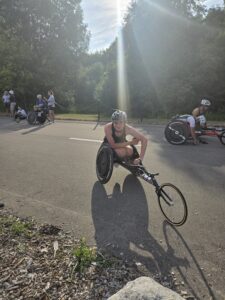
Brayden at the 2025 Move United Track Nationals
The hardest part of adaptive sports is getting started; whether it’s cost, finding a team, or even just overcoming fear about trying something new for the first time. The first step is to try to find a team or program near you — you can find many on the NWBA’s (National Wheelchair Basketball Association) website, Move United’s website (which is an organization that covers multiple sports), or through Quest’s Guide for Getting Involved in Adaptive Sports. Most organizations have programs where you can go to a practice, try-it clinic, or another experience just to test it out; and you can usually borrow the equipment needed for that sport.
I’ve tried A LOT of sports, including: wheelchair basketball, adaptive track and field, wheelchair rugby, quad rugby, boccia ball, swimming, power soccer, and a few other sports. Many of which I never expected to like, but I did. I never expected to like wheelchair basketball, and now it’s a huge part of my life. You may NEVER expect to like any sport, but you don’t know until you try.
The community of adaptive sports is so special and has some of the least judgmental people that I have ever met. Even if you don’t like the sport, by trying it – you may just find an amazing community of people with a variety of different disabilities and talents who will empower you.
Next Steps and Useful Resources
- For more information about Charcot-Marie-Tooth disease (CMT), a full list of symptoms and causes can be found here.
- Learn more about adaptive sports and resources, here.
- Watch MDA’s Adaptive Recreation Facebook Live on-demand.
- For kids with neuromuscular diseases, MDA Summer Camp offers an opportunity to try new sports and activities in a safe and empowering environment.
- Learn about more ways to stay active with accessible outdoor recreation.
- To learn more about MDA’s Young Adult Programs, visit here.
- MDA’s Resource Center provides support, guidance, and resources for patients and families. Contact the MDA Resource Center at 1-833-ASK-MDA1 or ResourceCenter@mdausa.org
- Stay up-to-date on Quest content! Subscribe to Quest Magazine and Newsletter.
Disclaimer: No content on this site should ever be used as a substitute for direct medical advice from your doctor or other qualified clinician.




